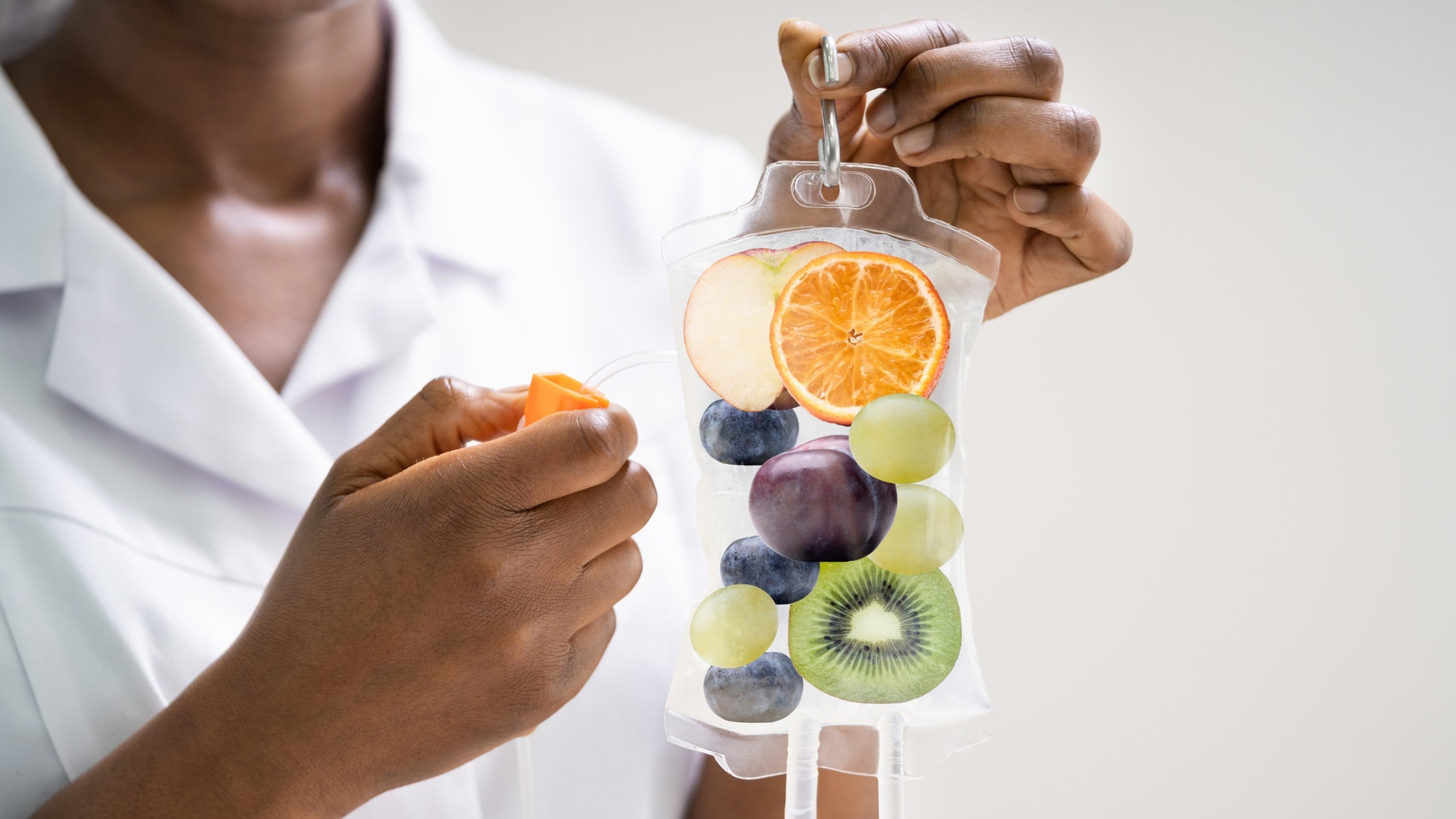Unpacking the Pros and Cons of Vitamin Drips: Are They Good for You? - A South African Perspective

In the quest for optimal health and wellness, we're exploring the world of IV vitamin therapy. Traditionally, this method has been a lifeline for those unable to consume adequate food or with conditions hindering nutrient absorption. But is it beneficial for everyone?
From rehydrating after intense exercise or a night of overindulgence, to immune system boosts and energy surges, IV vitamin drips promise a plethora of benefits. Yet, it's crucial to remember that a balanced diet usually provides healthy individuals with all the nutrients they need.
However, there's a flip side to this coin. Overdoing it with IV vitamin drips can lead to an excess of certain vitamins or minerals, potentially causing adverse effects. So, are vitamin drips really good for you? Let's delve deeper and weigh the pros and cons.
Key Takeaways
- Vitamin Drips, also known as IV Drip Therapy, are a potent infusion of vitamins, minerals, amino acids, and antioxidants delivered directly into the bloodstream.
- IV Vitamin therapy can offer immediate absorption and benefits, including immune system boosts, energy surges, and rapid recovery, particularly helpful for individuals suffering from conditions that hinder nutrient absorption or for rehydration purposes.
- Overconsumption of IV vitamin drips can lead to potential vitamin or mineral excess, which could cause adverse effects, hence must be professionally managed.
- While vitamin drips offer benefits such as immune system boost, enhanced hydration, and support in weight loss efforts, they can also carry risks like potential infection, skin reactions at the injection site, and discomfort during administration.
- Individuals with certain health conditions like G6PD deficiency, Hemochromatosis, kidney disorder or known allergies to ingredients in the vitamin drips should avoid IV Drip Therapy.
- Scientific evidence on vitamin drips highlight both supporting and limiting findings, focussing on their perceived benefits and potential concerns. It's thus essential to consult with a health professional before commencing any IV drip therapy.
- Alternatives to Vitamin Drips include oral supplements and maintaining a nutrient-rich diet that can provide needed vitamins and minerals, albeit potentially at a slower absorption rate.

Understanding Vitamin Drips
Are you finding your usual multivitamins no longer cutting the mustard? If so, it's time to look beyond the standard approach and consider an exciting, more potent alternative - namely, Vitamin Drips.
What Are Vitamin Drips?
Vitamin Drips, also referred to as IV DRIP THERAPY, offer fast, efficient replenishment of vital nutrients within the body. Seated in the fusion between modern medical science and holistic wellness, these intravenous infusions deliver a potent mix of vitamins, minerals, amino acids, and antioxidants directly into the bloodstream. These are not your run-of-the-mill vitamin booster shots. They're a power-packed upgrade.
Imagine devouring a heaped fruit salad, containing the freshest array of Vitamin C-rich fruits, and witnessing the nutrients get happily soaked up by your body instantly. No loss, maximum absorption - that's Vitamin Drips for you. In precise doses and combinations, these drips aim to provide health remedies for conditions including dehydration, hangovers, and even skin imperfections.
Ever heard of the Skin lightening Drip offered by Skin Reform? It's an exquisite example of such specialised IV treatments designed for targeted outcomes. But remember, these are not magic potions. Yes, they do work wonders. Especially when tailor-made to individual needs, but there's more to this effect than meets the eye.
How Do Vitamin Drips Work?
This is where medical knowledge sprinkled with a tad of biological fanfare steps in. Your body houses a remarkable transportation network that is your bloodstream. When you opt for an IV Vitamin Drip, you're essentially sending an express parcel of nutrient-rich elements right into this network.
Take, for instance, the Vitamin C shot or the Vitamin B Shot. The beneficial contents of these shots once infused intravenously get distributed throughout your body in a matter of minutes, offering immediate absorption and utilisation at the cellular level. The result? Voila! Enhanced wellness and health benefits, including improved immunity, better stress management, and quicker recovery.
The Vitamin Drips, akin to a nutrient express line, circumvent the digestive system, eliminating the losses typically associated with oral intake. Now, consider getting these benefits in a relaxing, spa-like environment. Sounds like a winning shot, doesn't it?
However, as scientists and medical experts agree, vitamin treatment is not a 'one size fits all' journey. Therefore, it remains crucial to consult with professionals and undertake a thorough assessment before diving into the world of Vitamin Drips.
Potential Benefits of Vitamin Drips
In the dynamic intersection of medical science and wellness, the emergence of IV vitamin drips is a notable development. Let's explore some associated health benefits.
Boosting Immune System
One of the main benefits of vitamin drips, such as Skin Reform's Vitamin C shot, is their potential to give the immune system a welcome boost. IV Drip Therapy ensures an impressive absorption rate, given the direct supply into the bloodstream. Simply put, the nutrients don't just knock on the body's door, they stride right in, making the impact immediate and significant.
Enhancing Hydration
Another remarkable advantage of Vitamin Drip therapy is its ability to supercharge one's hydration levels. Ever felt the unpleasant aftermath of a night of indulgence? Drips can replenish lost water, easing discomfort in moments. A splash of sodium chloride added to the mix can also take care of annoying dehydration symptoms like fatigue and dizziness. Anti-nausea and anti-inflammatory measures can soften the drinking side-effects, a bonus given the IV drip infusion process.
Supporting Weight Loss Efforts
Finally, let's talk weight loss. While it's no magic potion, Vitamin Drip Therapy could support one's efforts to lose weight. Essential nutrients delivered directly into the system can help with improved metabolism, stepping up the body's fat-burning ability. But remember, it's a team game: diet, exercise and lifestyle changes still play crucial parts in the weight loss journey.
Vitamin Drips, a potent combination of science and wellness, can offer multiple health benefits. As always, a word with professionals before you delve into IV Drip Therapy won't go amiss. Let's weave health and wellness, drip by vitamin-rich drip.
Common Risks and Side Effects
IV vitamin therapy, including the highly popular Vitamin Drips offered by Skin Reform's skin lightening drip, may bear some risks and side effects. Ensuring the administration is appropriate and safe should remain a priority.
Possibility of Infection
A well-known caution with any intravenous method, be it IV Drip Therapy or a simple Vitamin Shot, is the potential for infection. An infection can occur if bacteria from the skin or air find their way into the body via the IV catheter. This risk, although minimal with proper aseptic techniques, is inherent in invasive procedures. Consulting with a professional, such as those found at Skin Reform, is necessary to mitigate the potential risk of infection.
Skin Reactions at Injection Sites
While the Vitamin B Shot or a Vitamin C shot can offer potent benefits, these aren't without potential side effects. Users may notice skin reactions at the injection sites. Common symptoms include pain, bruising, bleeding, swelling, or inflammation. The skin, being the first line of defence against disease, might show these reactions as part of its response to a foreign body, like a needle. Healthcare providers can monitor and manage these effects if they arise.
Pain and Discomfort During Administration
Not everyone responds the same to needles. While some people have a high pain tolerance, others might find the injection process uncomfortable. Discomfort is often a result of nerves at the injection site triggering a pain response. This is a normal reaction and usually short-lived, but can be off-putting for some. It's essential to understand these potential risks and discomforts before opting in for drips such as Skin Reform's Vitamin Drip. Despite these possible side effects, recall the numerous advantages they offer when professionally administered.
Who Should Avoid Vitamin Drips
Vitamin drips, such as the ones offered by Skin Reform, are praised for their myriad benefits, from hydration enhancement to skin lightening effects. However, they aren't a suitable health intervention for everyone.
Pre-existing Health Conditions
Certain individuals dealing with health conditions may find it prudent to avoid IV drip therapy. Those with Glucose-6-phosphate dehydrogenase (G6PD) deficiency, a genetic disorder that destroys red blood cells, fall in this category. Red blood cells play a vital role transporting oxygen to body tissues, thus their deficiency could pose potential health risks with IV drips.
Another group includes individuals battling with Hemochromatosis, an illness that results in toxic iron accumulations in the bloodstream. People diagnosed with kidney disease who have impaired kidney function also might find it safer to steer clear of vitamin drips.
Allergic Reactions to Ingredients
It is important to consider the potential risk of allergic reactions. For instance, those consuming a vitamin C shot, vitamin B shot, or any other form of vitamin therapy must consider potential allergies to their components. Other ingredients included in the IV drip, such as sodium chloride and anti-inflammatory and anti-nausea medication, could equally cause allergic reactions.
To mitigate the risk of allergic reactions, clinics often provide a medical screening, also known as a good faith exam. This exam inspects the patient’s medical history and current medical condition, aiding the determination of the appropriate treatment protocol. But, even with these measures in place, anyone with known allergies to ingredients in the vitamin drips should exercise caution.
Remember, the safety of any health intervention depends not only on your health status but also on the administration by certified medical personnel. Before engaging with these procedures, it's essential to consult with a health professional to determine if you're a suitable candidate for IV drip therapy.
Scientific Evidence on Vitamin Drips
Delving into the scientific arena, let's weigh up the supporting evidence and potential concerns surrounding vitamin drips.
Studies Supporting Vitamin Drips
Discussing the efficacy of vitamin drips kickstarts this exploration. For instance, GaBi documents performing around 15,000 treatments, reporting that severe adverse reactions were almost non-existent. Additionally, combinations of IV vitamin therapy with chemotherapy demonstrated benefits for cancer patients. These findings, however, are on an individual practice level, and may not match the context of broad clinical trials.
More commonly available are hydration drips. These ripples of rejuvenation replenish lost water in minutes, offering a swift remedy for hangovers. The saline solution sails through the body, ferrying electrolytes, notably sodium chloride, to alleviate states of dehydration. Symptoms like fatigue, dizziness, and thirst, are shown the door. Numerous drip spas additionally infuse their cocktails with anti-nausea and anti-inflammatory components, furthering the fight against post-binge drinking effects.
Remember the last time you cut your finger peeling an apple? Remember how your skin repaired itself? This auto-restoration can get a boost through IV therapy. Vitamin infusions can champion wound healing and cell repair, proving especially valuable for your skin, the frontline defender against infections. Certain drip mixes could host an array of beneficial nutrients, like Vitamin C, Zinc, Arginine, and Glutathione, purported to work wonders on skin health.
Research Highlighting Limitations and Concerns
The scientific realm, however, does not solely portray a rosy picture. IV lounges and drip bars are without Food and Drug Administration oversight and their services are not scrutinised by the same body. This regulatory void signals that caution is key in pursuing these therapies, as the marketing fraternity may often sprint ahead of scientific validation.
Additionally, critics voice worries over unnecessary IV drips. Patients with heart or kidney disorders could find themselves in peril, receiving an overload of fluid or salts these organs aren't equipped to handle. Essentially, it's like trying to fill a small cup with a large bottle of water - overflow is inevitable.
Moreover, there's an unignorable sting from saline injections. Certain patients reported positive outcomes similar to true IV therapy users, underscoring a substantial placebo effect that could cloud objective assessments. Lastly, despite popular belief that an IV bag bursting with Vitamin C can ward off ailments, studies show little evidence to back this claim, even against COVID-19.
In the grand scheme, it's undeniable that vitamin drips, like our own Skin Reform's 'Skin Lightening Drip', can offer health benefits and alternatives for traditional therapies. Yet, it's equally crucial to appreciate the potential limitations and concerns, fostering a balanced perspective. Always remember, as Sam Torbati MD wisely suggests at Cedars-Sinai Medical Center, to check in with your medical provider before planning a visit to a drip clinic.
Alternatives to Vitamin Drips
Now that we've uncovered the specifics of IV drip therapy, particularly the Skin Reform's vitamin drips including the skin lightening drip, it's crucial to explore the alternatives. These alternatives exist in forms that your body has mastered the art of utilising over thousands of years—oral supplements and a balanced, nutrient-rich diet.
Oral Supplements
Oral supplements often come in forms such as Vitamin C and Vitamin B shots amongst many others. Similar to vitamin drips, these nutrients in a bottle provide a concentration of the essential minerals your body craves. Unlike drips, these are taken orally and processed by your body's ingenious digestive system.
According to Lauren Harris-Pincus, a nutrition communications specialist, our body's natural digestive process has internal safeguards for nutrient absorption which are bypassed during an IV drip therapy. This implies that oral supplements pose less risk of over-absorbing nutrients. However, it's important to realise that absorption rates with oral supplements can be slower and sometimes less effective compared to their IV counterparts. Keep in mind, too, to always consult your healthcare provider before starting any supplement regimen, as some vitamins can interact with medications and affect overall health.
Natural Nutrient-Rich Diets
Last but not least, it's impossible to overlook the good old-fashioned method of maintaining health through your diet. While we cannot match the instant hit a Vitamin Drip offers, natural nutrient-rich diets can offer a steady supply of essential vitamins and minerals to our body.
Embracing a diet rich in fruits, vegetables, lean proteins, and whole grains can provide you with most nutrients your system needs to thrive. For instance, including oranges in your diet can provide you with natural Vitamin C, almost negating the need for a Vitamin C shot. Similarly, food rich in B Vitamins like spinach or legumes, match a Vitamin B shot to a large extent.
To summarise, while vitamin drips from Skin Reform or elsewhere offer an efficient route to higher nutrient absorption rates, always remember there are other methods—like taking oral supplements or maintaining a nutrient-rich diet. It's about weighing your options, considering your unique health scenario, and making an informed choice.
Conclusion
Let's reiterate the key point: vitamin drips can be beneficial, but they're not without risks. It's vital to undergo medical screening before diving into IV therapy. While this method offers quick nutrient absorption, alternatives like oral supplements and nutrient-rich diets shouldn't be overlooked. They too have their merits and can be more suitable for some individuals. Always remember, it's about what works best for you and your health needs. Consulting healthcare providers before making such decisions is a must. After all, when it comes to our health, we should never compromise.
Frequently Asked Questions
Why might I feel unwell after vitamin IV therapy?
Everybody reacts differently to treatments, and while IV vitamin therapy is generally safe, side effects can occur. Commonly reported side effects include flushing, headaches, nausea, vomiting and dizziness. It's crucial to consult with a healthcare provider regarding any discomfort post-therapy to ascertain its cause and the appropriate remedy.
What should I do before a vitamin drip session?
To ensure a smooth experience during your vitamin drip therapy, it's recommended to hydrate by drinking plenty of water at least 24 hours prior to the drip. You can enhance water retention by adding salt to the water you consume.
Are vitamin drips effective?
Remember, the efficacy and safety of IV vitamin therapy is yet to be established through comprehensive research. It could present risks if not prescribed by a healthcare provider. It is advisable to always consult a healthcare provider before starting IV vitamin therapy for any health condition.
Are vitamin drips superior to pills?
Compelling reasons favour vitamin drips over oral supplements. Drips deliver nutrients directly and efficiently with high concentration and speed effects. They're also customisable depending on individual health requirements. Remember to weigh the pros and cons with a healthcare provider before choosing your nutrient intake method.
Who should avoid IV vitamin therapy?
IV vitamin therapy is not recommended for those with heart conditions or high blood pressure as the high-dose vitamin infusion could lead to fluid overload. This overload can potentially, though rarely, cause permanent damage to kidneys, brain, or heart. Always consult a healthcare provider to assess your suitability for any medical treatment.





